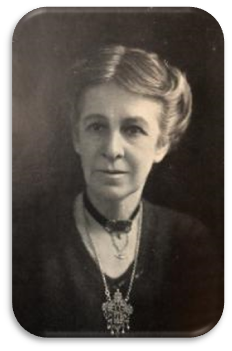Saint of the Week: Evelyn Underhill
6/18/2025

Evelyn Underhill
1875 - 1941
Theologian and Mystic
Evelyn Underhill (1875 – 1941) was born in Wolverhampton. She was a poet, a novelist, a pacifist and a mystic. An only child, she described her early mystical insights as "abrupt experiences of the peaceful, undifferentiated plane of reality—like the still desert of the mystic—in which there was no multiplicity nor need of explanation." The meaning of these experiences became a lifelong quest and a source of private angst, provoking her to research and write. Both her father and her husband were writers of legal matters, London barristers, and yachtsmen. She and her husband, Hubert Stuart Moore, grew up together and were married on 3 July 1907. The couple had no children. She travelled regularly within Europe, primarily Switzerland, France and Italy, where she pursued her interests in art and Catholicism, visiting numerous churches and monasteries. Neither her Protestant husband nor her parents shared her interest in spiritual matters. Underhill's life was greatly affected by her husband's resistance to her joining the Catholic Church to which she was powerfully drawn. At first, she believed it to be only a delay in her decision, but it proved to be lifelong. He was, however, a writer himself and was supportive of her writing both before and after their marriage in 1907, though he did not share her spiritual affinities. She was a prolific author, publishing over 30 books either under her maiden name or using the nom de plume, John Cordelier. Initially agnostic, she acquired an interest in Neoplatonism. From there she was drawn to Catholicism against the objections of her husband and eventually became a prominent Anglo-Catholic. Her early spiritual mentor Baron Friedrich von Hügel, appreciated her writing yet, concerned with her focus on mysticism, encouraged her to adopt a much more Christ-centric view as opposed to the theistic, intellectual one she previously held. After his death in 1925, her writings focused more on the Holy Spirit and she became prominent in the Anglican Church as a lay leader on spiritual retreats, a spiritual director for hundreds of individuals, guest speaker, radio lecturer, and proponent of contemplative prayer. She sought the center of life as she and many of her generation conceived it, not in a state religion, but in experience and the heart. As an only child, she was devoted to her parents and, later, to her husband. She was fully engaged in the life of a barrister's daughter and wife, including the entertainment and charitable work that entailed, and pursued a daily regimen that included writing, research, worship, prayer and meditation. It was a fundamental axiom of hers that all of life was sacred, as that was what "incarnation" was about. She was often criticized for believing that the mystical life should be accessible to the average person.



